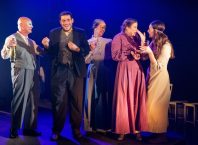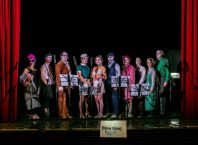The 8th Masrahid Festival for monodramas in Arabic took place from August 11 – 13 in Acco. Seeking not only to provide a stage, but to encourage the creation of new works in Arabic, this year’s festival was preceded by a six month series of writing and staging workshops directed by Firas Rubi. As an additional encouragement to aspiring playwrights, a prize was awarded for the best play among the seven participating monodramas. “Not the Ship of Noah” by Marwan Makhoul, received the award for Best Play at the festival’s closing ceremony Thursday night. First Prize in the festival went to “Herzl Said” by Iyad Barghouti, directed by Munir Bakhri and performed by Ghassan Abbas.
The first Masrahid festival took place in Haifa in 1992 and after a long interval; the festival was re-launched in Acco in 2001. Art directors for the festival are: Smadar Yaaron, Usama Masri and Firas Rubi, and the artistic committee includes: Jerias Tanos,Smadar Yaaron, Moni Joseph, Usama Masri, and Abu Ali khald. In addition to the competing monodramas there were several guest performances: Mizmar Band, Zaman Band, Ibraheem Khalil Band, and the Rimaz Dance Ensemble. Two additional plays were invited to participate in the festival: Hassem Yassin’s “Hello Peace” performed in Hebrew, and “Held on the Threshold” directed by Prof. Shimon Levy and performed in English by Henriette Ceipek.
The Old City of Acco with its beautiful courtyards, stone arches and ancient buildings transformed to theatrical halls, creates an inviting atmosphere for the festival, which attracted a diverse, multi-age crowd. The two plays I attended on the first night of the festival – “Herzl Said” and “Not the Ship of Noah” – were performed to a full house. Standing in front of the entrance to the theatre before the first play, I chatted with another person waiting before the door, who turned out to be the playwright, Iyad Barghouti. I didn’t have a chance to ask him about the play before he was deep into a political discussion with Elizur Reuveni, whose photographs accompany this article, about the existence of different narratives of history. The atmosphere was somehow charged yet friendly, the two agreed to disagree and we entered the theatre.
Barghouti’s play “Herzl Said” relates the story of an Arab man who has taught history, Jewish history, in the Israeli school system for 27 years. Performed with a perfect combination of passion and restraint by Ghassan Abbas, the teacher Haled confronts his past and attempts to resolve his crisis of identity within an absurd situation. Directed by Munir Bakhri, the play was performed in Arabic, with Hebrew superscripts.
I then saw “Not the Ship of Noah,” the first play written by poet Marwan Makhoul. Director Norman Issa describes the play as being about “a young man closed in a room. His mind is unquiet because of his relationship with his brother who is physically handicapped, yet there exists a healthy mind and spirit within. He takes upon himself a great deal of guilt for his brother’s condition.” The set consists of four poles set on each corner of a square stage covered with white paper. Piles of newspapers surround the stage and figure prominently in the performance. Issa says “the newspapers symbolize the bullshit that surrounds and nurtures us. The protagonist makes paper boats out of the newspapers; he has a dream of making a large boat to take his brother away, out of the country.”
Translation was not provided for this play, which created an interesting situation for audience members like me, whose knowledge of Arabic is extremely limited. Rabii Khoury was fascinating to watch, as he entered into dialogues with his father and brother (two words I could identify) in the course of the play, emotions dancing on his expressive face as he navigated the troubled waters of those relationships. Listening to the plays made me acutely aware of how rare it is for me to attend a performance in Arabic, how these two cultures, Hebrew and Arabic exist in such close proximity, yet remain worlds apart. Talking with the playwright and director about the question of translation after the play, Issa commented, “Masrahid is plays in Arabic, the fact that you do not understand Arabic is your problem.”
It is a problem that most cities in Israel avoid fairly easily, as the two cultures usually live in different places; Acco is exceptional in that regard. Mayor Shimon Lankry said, “We live one inside the other. It’s not like Tel Aviv – Jaffa or Nazareth where there are really two separate communities geographically and socially. I lived in an apartment block for five years where we were six Jewish families and six Arab families. Acco is a challenge, an experience. It’s an amazing place, multi-cultural – and I see this as an advantage.”
Lankry, who spent ten years as director of youth activities and sport in Acco before becoming mayor, does not deny the difficulties: “When different cultures live together, especially living through so many wars in such a short time frame, reading reports in Al-Jazeera on one hand, and Israeli media on the other, there are tensions and these tensions rise to the surface. I was a platoon leader in the IDF, my approach is practical – to find a solution to the problem. Culture is very close to my heart, we strongly support the arts in Acco and Acco is constantly improving itself, both in appearance and socially, but there is still much to be done.”
In the festival’s opening ceremonies a prize for lifetime achievement was awarded to Samir Khoury, director of the Jbeneh Theatre. Khoury addressed the audience in Arabic and later commented to me, “I didn’t realize that it would feel so exciting to receive a prize.”
The plays participating in the competition:
Herzl Said by Iyad Barghouti
Directed by Munir Bakri, performed by Ghassan Abbas
Production: Theatre Al LaJune
Not the Ship of Noah by Marwan Makhoul
Directed by Norman Issa, performed by Rabii Khoury.
Music: Mira Awad
Production: Al- Saraia Jaffa
Bisher (Straight) by Adnan Trabshi
Directed by Amar Hlihl, performed by Shaki Fakher Al-Din.
Production: Theater Al-Mraia.
Bisher, a young man approaching adulthood, reflects on sexuality and the “future”.
President Sadat & Masters by Naji Dahar
Edited & directed by Hisham Suleiman, performed by Iyad Shity
Production: Theatre Ensemble Fringe-Nazareth
A Palestinian actor portrays President Anwar Sadat in the Masrahid Festival yet feels conflicted about the role he must play…can he effect a change?
The Teacher by Roberto Athayde
Edited & directed by Arie Yas, performed by Mahmoud Mora.
Production: Theater Al-Ajial- Tamra.
Camel, who wanted to be a pilot, has ended up as a teacher of Arabic. He wants the respect he deserves from his students, and tries to teach them something about life.
The Dark Side of the Moon by Bayan Antir.
Directed by Bayan Antir, performed by Kity Yaakob
Play by- Director: Bayan Antir.
We cannot see the dark side of the moon and critique of our society is carried out in whispers – except on the stage where it is presented through the memories of a woman.
Diary of a madman by Nikolai Gogol
Edited & Directed by Tayeb Sidiki, performed by Muhammed Zoher
Production: Theater Al-Nas- Morocco
A simple clerk in love with the boss’ daughter discovers that he is the heir to the throne of Spain and fights for his crown.






i always participate in youth activities because it is good for socializing with other people.`,”
Comments are closed.